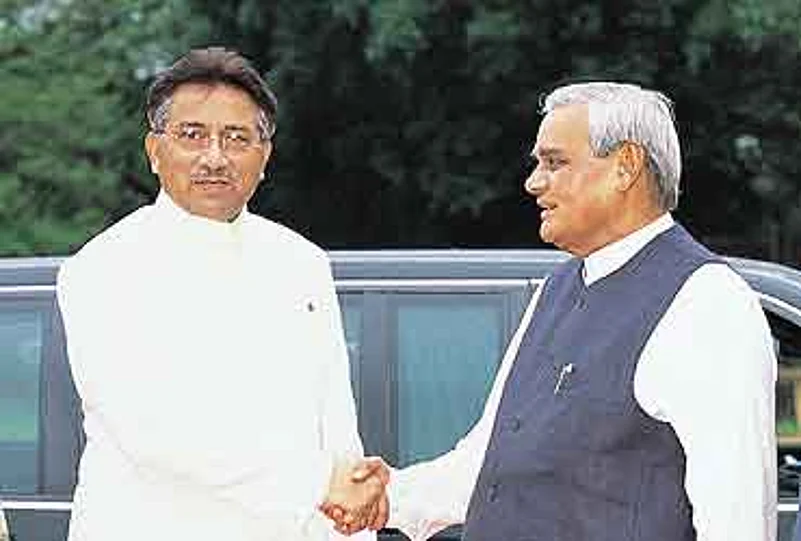
Pervez Musharraf certainly would have preferred Vajpayee to remain at the helm of India's affairs. The Pakistan president will now have to work out a fresh political equation with the new Indian PM. The ouster of the Vajpayee government is also expected to delay, at least temporarily, the string of meetings planned between Indian and Pakistani officials. Agrees senator Mushahid Hussain, "Bilateral relations will not change but the pace might become slower. The new government might have its own schedule for the peace process; it might not be possible to resolve the Kashmir problem by the year-end."
Many Pakistanis feel the Congress will adopt a hardline stance on Kashmir, under the influence of former bureaucrats evolving the party's foreign policy. As former foreign secretary Dr Tanveer Ahmed says, "The return of Congress isn't a setback to the peace process. But the party may be slow off the block as the group that formulates its foreign policy has former bureaucrats like J.N. Dixit and K. Natwar Singh, cast in the old mould and having a hardline stance on Kashmir. Negotiations on Kashmir will now be tougher."
On May 13, as it became obvious that New Delhi was to have a Congress-led government, many journalists teased officials in the foreign office saying that all their work to improve Indo-Pak ties would now go waste. An official, though, said tersely, "Pakistan desires peaceful and cooperative relations with India and looks forward to renewing the quest for promoting peace and stability in South Asia with the new government in India." They could take heart from Sonia Gandhi's declaration at a press conference on May 13 that her party will be commited to the peace process. But the return of the Congress in New Delhi could possibly redefine India's relationship with the West, particularly the United States. For one, India will take a more critical stance towards US policy in West Asia, both in Palestine and in Iraq. The presence of the Left could also push New Delhi into adopting a more strident position on universal nuclear disarmament, much to US chagrin. Yet, simultaneously, Washington could be pleased to see India, under the pressure of the Left, slow down its nuclear programme.
Says Stephen Cohen, senior fellow at the Brookings Institute in Washington, "The new government is likely to be tougher on issues like Iraq and West Asia. It might not be as close to Israel as the bjp government. But there won't be a reversal of relations with Israel." He, however, feels the US will get on fine with the Congress. "The Left will do some anti-US complaining and moaning," Cohen predicts. "There'll be changes around the edges, in emphasis, in style, but no fundamental changes. In any case it's perfectly healthy to change politics as a result of democratic polity; we do it here."
Washington and London will watch closely the approach of the new Indian government towards Pakistan. Dr David Washbrook, an Oxford historian, echoes many others when he expresses hope that "improvement of relations with Pakistan will continue". Cohen is in fact quite optimistic: "The Congress may move just as fast as the bjp, even faster. If there is no movement, I'd continue to predict a crisis. Something has to happen, on both sides."
The West is also concerned whether economic liberalisation will continue under the new dispensation. Washbrook predicts a definite change in emphasis. "A Congress government would be to a degree slower and more cautious in the way it continues with economic reforms and deregulation. It's likely to place more emphasis on economic redistribution to the poor. In that case there would be a slight shift to the Left, but nothing dramatic or radical."
Gareth Price, researcher at the Royal Institute for International Affairs, London, feels the Congress will impart a new focus on agriculture. "If there is one thing the elections show, it's that rural India has not benefited from the recent economic success. An emphasis on agriculture could stimulate wider economic growth that would be more sustainable, rather than produce only small pockets of success while the rest of the country stagnates."
Cohen thinks the Congress will present liberalisation differently from the bjp. "But the basic drive to liberalisation won't stop. It was started by the Congress." He feels no Indian government will reverse liberalisation because its "results have been sensational. India's transformed but it still has half the world's poor".
Observers think the new government is expected to address distribution issues. As Cohen points out, "So far there are huge gaps in the way economic benefits have trickled down. But liberalisation creates wealth for everyone. It makes the pie bigger. The new government will want to distribute it differently, but it will keep baking the pie. India now needs an economic revolution in the countryside."
The West is also concerned about the reaction of the Hindu right to the defeat of the bjp government. Dr Washbrook argues, "The Hindu right is expected to get back to radical politics. They might talk about the temple more. And the bjp leadership could now find it difficult to restrain the extreme right from outside." Others, though, feel the process of cultural redefinition of India could slow down. They say the Hindu right has to adjust to the new reality: it doesn't possess power, and it knows the new Congress-led government, particularly because of the Left, will now counter it severely.





















